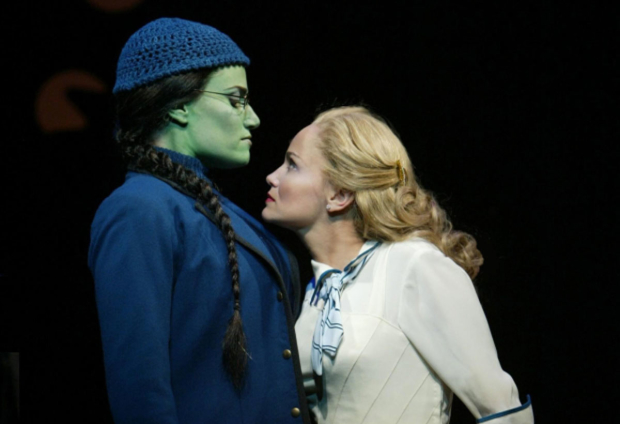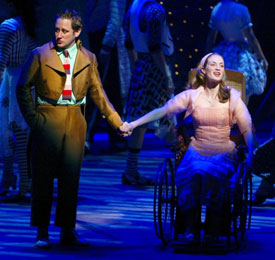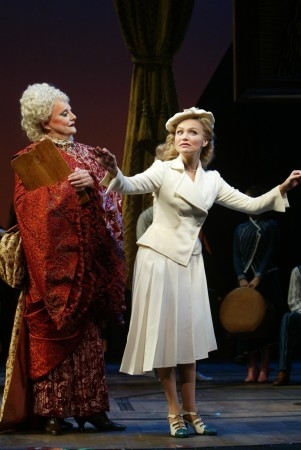
(© Joan Marcus)
L. Frank Baum’s Oz books lend themselves to many interpretations. I’ve always thought that The Wonderful Wizard of Oz could be construed as an allegory of psychoanalysis — you know, traveling the Yellow Brick Road (Sigmund Freud called dreams “the royal road”) in order to return “home” with a better understanding of oneself. Baum was writing when Freud was refining his theories, and great minds often think along the same lines.
So I suppose that structuring the musical Wicked as an allegory of fascism is a notion for which librettist Winnie Holzman and songwriter Stephen Schwartz shouldn’t be tarred and feathered, no matter how much devoted fans might wish it. After all, this bloated and blatant new show is based on Gregory Maguire’s 1995 novel of the same name and, in upending many of Baum’s conceits, Maguire seems to have had something of an outlandish allegory in mind. He even had the Wizard of Oz, a force for repression in this revisionist view, eventually seeking shelter in a bunker.
In writing an Oz prequel that explains how Glinda (formerly known as Galinda) and the Wicked Witch of the West (also known as Elphaba) earned their disparate reputations, Maguire also examined the concepts of good and evil. Moreover, on the evidence of his dense volume, he was tangentially interested in the benefits of friendship as seen through the developing Glinda-Elphaba relationship. (The name Elphaba is a reference to Baum’s initials: L.F.B.) Holzman and Schwartz have lifted the above elements from Maguire in constructing their tuner. In some instances, they elaborate on them so’s to make a point or two about current fears of gathering repression. In a song called “Something Bad,” Elphaba (Idina Menzel) belts the phrase “It couldn’t happen here.” Later, Glinda (Kristin Chenoweth), who has already struck an Eva Peron-like pose borrowed from Evita, refers to “a regime change.”
Yet, in other aspects, Holzman and Schwartz have been loose — very loose — in their adaptation of Maguire’s work, which wouldn’t be a problem if they had come up with their own lucid narrative. But that’s just what they haven’t done in this meagerly rewarding hodge-podge of convoluted plot and overblown special effects. Here, the vain Galinda meets the literally green Elphaba at Shiz University, where they’re both studying sorcery. (Anyone who feels that Wicked has been influenced by the Harry Potter novels is right on the money.) Although Elphaba is chosen by schoolmistress Madame Morrible (Carole Shelley) to meet the vaunted Wizard (Joel Grey), both girls trot off to do so. That’s when they discover that the Wizard is a faker and the villain behind the silencing of Oz animals, including their own goat professor, Doctor Dillamond (William Youmans). (When the horned Doctor Dillamond is banished from his teaching position, is it far-fetched to perceive him as representative of the Jews in Nazi Germany?)

(© Joan Marcus)
Elphaba finds herself at odds with the Wizard and becomes a pariah when he gives out that she’s a witch; the vacillating Glinda, on the other hand, is celebrated as good. And so the two sort-of-friends find themselves in separate camps that overlap only because the princely Fiyero (Norbert Leo Butz) becomes engaged to marry Glinda but harbors a romantic desire for Elphaba. Meantime, while trying to elude the Wizard, Elphaba continues to care for her wheelchair-ridden sister Nessarose, who’s tended to by the loyal Munchkin Boq (Christopher Fitzgerald). Nessarose, by the way, is the supposedly wicked witch who wears ruby slippers and who is killed when Dorothy’s house lands in Oz. (N.B.: The famous slippers were silver when Baum wrote about them, but this production is true to the 1939 MGM movie on that account.)
“Can you understand what’s going on?” my companion asked when the first act ended with Elphaba defying gravity (levitation courtesy of ZFX Flying Illusions) as she decides to be the witch that she’s been branded. “No,” I said, because I couldn’t understand the sloppy writing in which characters don’t remain psychologically consistent and incidents follow no discernible logic. Nor could I understand the cheap jokes launched by Holzman, who’s respected for her thirtysomething and My So-Called Life telescripts. Glinda insists on calling Boq “Bick,” for instance, and both Glinda and Madame Morrible use made-up words with a high cuteness quotient. Among other ear insults, Glinda has to say “scandalacious,” “hideoteous,” and “gratitution.” When Glinda and Fiyero announce their pending nuptials, a sign that unfurls above them reads “Congratulotions.”
What I did comprehend was that in Wicked — reportedly much rewritten since its San Francisco tryout — a great deal of money and talent is being wasted. Chief among those exploited is so-called critics’ darling Kristin Chenoweth. The creative team, including the usually tasteful director Joe Mantello, takes advantage of her winning ways by giving her that bilious vocabulary and asking her to do everything but wink at the paying crowd in an attempt to get everyone on her side. Although she gets through the show with her reputation intact, Chenoweth’s performance is definitely a case of gilding the Glinda.
Idina Menzel, slathered with a green coating more institutional than emerald, escapes Chenoweth’s snooky-ookums burden and doesn’t have to wear the sort of soufflé clothing in which Susan Hilferty has rightfully outfitted Glinda. Menzel’s straightforward acting and singing — miked so that she can be heard in Wyoming — are among the evening’s very few joys. The other cast members, gussied up in Hilferty’s imaginative wardrobe and rising above what they have to say and do (this levitation not courtesy of ZFX Flying Illusions), include the comically imperious Carole Shelley in an Elizabeth I coiffeur; the always magnetic Norbert Leo Butz; Michelle Federer as the now-nice, now-haughty Nessarose; and Christopher Fitzgerald, a first-rate entertainer and clown who unfortunately gets far too little stage time as Boq. Joel Grey, as the exceedingly un-Baumlike Wizard, is peppy when called on to be.

(© Joan Marcus)
Of course, all of these performers would register more effectively if they had outstanding songs to sing and outstanding dances to dance. Well, it’s a musical, isn’t it? The unfortunate news is that Wayne Cilento’s choreography is scant and uninteresting and that none — count ’em, none — of the Stephen Schwartz songs are up to the level of the best material he’s written over the past 35 years or so. Chenoweth floats some pretty high notes on a few of Schwartz’s melodic lines and the hard-working Menzel almost makes good on the songs she thrillingly toots, one of them a power ballad shared with Butz (“As Long As You’re Mine”). Grey, working his eyes and fleet feet as strenuously as his mouth in a ditty called “Wonderful,” also has a few moments — but they come courtesy of the singer, not the song.
The genuinely imaginative work on Wicked has been done by set designer Eugene Lee, although much of what’s on display — a dragon belching smoke at the proscenium top, a lot of clockwork cogs — seems to have been produced with the Time Dragon motif from Maguire’s book in mind, but that motif is not explained in the script as it stands. Kenneth Posner’s lights are gorgeous and Tony Meola’s sound, but for Menzel’s miking, is commendable. Overall, however, the makers of Wicked deserve no congratulotions.









